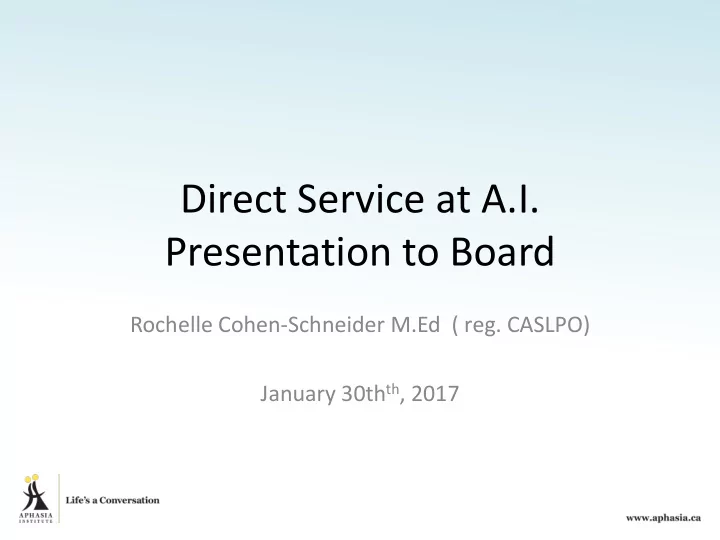

Direct Service at A.I. Presentation to Board Rochelle Cohen-Schneider M.Ed ( reg. CASLPO) January 30th th , 2017
Aphasia has a serious impact and affects 1/3 of stroke patients • Based on extrapolation from current stroke stats *, there are 7,864 new cases of aphasia each year in Ontario • Almost 60,000 people living with long-term impact of aphasia in Ontario – This is comparable to/more than prevalence of Parkinson’s and MS • The impact is much greater given the toll on the whole family * Heart and Stroke Foundation website * Krueger, H., Koot, J., Hall, R. E., O’Callaghan, C., Bayley, M., & Corbett, D. (2015). Prevalence of Individuals Experiencing the Effects of Stroke in Canada Trends and Projections. Stroke, 46 (8), 2226-2231. * Ng, R., Maxwell, C.J., Yates, E.A., Nylen, K., Antflick, J., Jetté, N., Bronskill, S.E. Brain Disorders in Ontario: Prevalence, Incidence and Costs from Health Administrative Data. Toronto, ON: Institute for Clinical Evaluative Sciences; 2015
Changing the Aphasia Narrative (ASHA leader November 2013 ) • Traditional definition of aphasia • Aphasia is a language problem that masks inherent competence and most dramatically affects conversational interaction • Conversational interaction is core to the ability to participate in virtually every realm of adult life • Without the ability to participate in conversation every relationship, every life role and almost every life activity is at risk
Aphasia Institute’s Synergy of Service
Direct Service :Guiding philosophies • Life Participation for Adults with Aphasia • A-FROM • Legislation – AODA etc
Life Participation Approach to Aphasia (See LPAA Project Group, 2001) • Explicit goal is enhancement of life participation • All those affected by aphasia are entitled to service • Measures of success include documented life enhancement changes
Life Participation Approach to Aphasia (See LPAA Project Group, 2001) • Personal and environmental factors are targets of intervention • Emphasis on availability of services as needed at all stages of aphasia
Living with aphasia: Framework for outcome measurement (A-FROM)
Facts about our programs • Attendance - 40 clients in this a.m. - 17 away - 17 volunteers • Schedule - 9.00 - 9.45 Volunteer preparation ( knowledge and inspiration ) - 9.45 - 11.00 Volunteer led program sessions - 11.15-12.00 Volunteer –staff debrief • Staff Communication : Managing the shared client - Morning “huddle” - DAR - Program staff meetings
Fun Facts : Wanna Join In ? - 4 Conversation Programs - 2 “Focused” Conversation Groups - 6 Exercise Programs per week ( different levels) - 1 Bridge program - 1 Card Drop in Program - 1 Book Group - 1 Debate Club - 2 Technology Programs – drop in ; regular group - 1 Living and Learning Program - 1 Creative Expression Group - 1 Karaoke Group - 2 Toastmaster's Group - 2 Painting Programs - Volunteer Resource Program Conversation underlies each of these programs – every volunteer trained in SCA
Your top 3 favourite EATING OUT OR ORDERING IN Bolded key words FOODS? Pictographs Pizza Burgers Fries Gestures and ways Do you want to make a change ? of responding Yes No Do you want to decrease ? Yes No Decrease by how much ? Once a day? Week Twice a week? Multiple X X Week Choices Three times a week? X X X Other? Week
And there is more…. • Outtings • Outreach Program
Goal for clients of the Aphasia Institute This is achieved through lowering communication barriers and providing opportunities for full life engagement
Pathway through the Aphasia Institute • Referral • Assessment • Introductory Program • Community Aphasia Program
Referral • 95 % referral come from SLP • CCAC gatekeepers of Adult Day Programs (ADP)
Assessment
Introductory Program • 12 week group based, volunteer run psycho- educational program • Changing the narrative/ story – Telling your stories – Listening to stories • Reframing possibilities
Operational Plan 2016/2017 Area 2 : Maintain high standard of service and continue to align this with agency synergy related to research and education • Primary Progressive Aphasia (PPA) • Intensive Partner Training Program • Your Life
PPA • Successfully received a small one time grant to hire full time CDA Developed a robust model which is in the • • Create a manual codifying the program process of being codified • Run 1-2 programs for persons with PPA and their • Will run 3 programs by end of fiscal year conversation partners • Redesigned the program to meet needs • Looking at Pathway – talked with Neurology Program , Alzheimers Society (joint programming) • Skype program • Life Story • To be presented March 2017 at Aphasia Access
Intensive Training • Codify curriculum • Completed • Write marketing brief • Completed – big job to articulate what we do and how we are different to other programs • No uptake this year. Have a • Offer 1 program another date to work towards in the next fiscal year
Your LIFE • Deepen knowledge of product so • Completed we can develop a training • Trainings directed to Activation Coordinators Training in March 2017 • • Train 2-4 volunteers • Completed • Trained as part of training program for external participants Create 10-15 Life Story Books • On our way • • Presentation at ASHA Nov 2016
Some factors for consideration : OPS Plan 17/18 Area 2 • Younger referrals • More PPA referrals • Focus on Stroke • Intensive Program
Recommend
More recommend